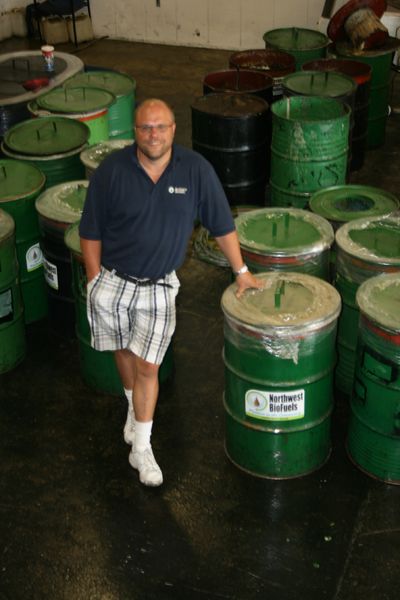Down to Earth Profile: Doug Bartlett, Driven to success

Kermit the Frog was spot on when he sung about how tough it is to be Green.
Just ask Doug Bartlett, president of Northwest BioFuels in Spokane, who says taking the leap into new sustainable business ventures can be socially rewarding, but can put one deep into unfamiliar, uncharted waters. More often than not, this plunge puts your own ‘green’ on the line.
“When you have money in the bank, you feel invincible,” he said.
Not long ago, Bartlett was in the wholesale car business, and if he had remained there, he thinks he would be very rich today.
But about five years ago he drove a car powered by vegetable oil, and his life, not to mention his bank account, have never been the same since.
In 2004, when his wholesale car business was doing well, gas prices started rising to around $2-3 per gallon. It made him mad — want to learn about other fuel options.
“I had heard from one of the painters who worked on some of my cars that you could run a vehicle on vegetable oil, and it piqued my curiosity,” he says.
Being a car nut, he added a vegetable oil fuel system to his wife’s 2003 Volkswagen Jetta one winter evening in 2005.
Bartlett remembers turning on the ignition and driving the car two hours straight, with the familiar, but unexpected smell of fresh popcorn emitting from the tailpipe.
“It changed my life,” he says.
His next move later that year was to start a business to share his auto discovery with others: Bartlett Greasecar, which specialized in putting Greasecar Vegetable Oil Fuel Systems in diesel vehicles.
He broke away from selling Greasecar Fuel Systems in 2007 and started his own simplified engine product, Bartlett Vegetable Fuel Systems.
“It’s a totally different than Greasecar’s system, and I’m planning on selling it on the Internet,” says Bartlett. “We use different metals, a unique filter housing, and we put the electronic parts in one single gauge to keep it simple.”
By 2008, his vision went beyond the mechanical methods needed to run a vehicle on vegetable oil. He focused on collection, refining, and reselling of restaurant waste vegetable oil as local vegetable oil suppliers were being bought up and restructured to the point where he said it was difficult to get the fuel necessary to run converted vehicles.
He started Spokane County Biodiesel, which today does business as Northwest BioFuels.
“Doug is a classic entrepreneurial type,” says Stephen Fitch, Northwest BioFuels’ controller. “He sees a concept and is driven to put it into motion.”
The biofuel market crashed after the rise and fall of last year’s gas prices, leaving Bartlett with a product worth less than when he first began his waste vegetable oil business.
He and his investors did a little soul-searching but decided to keep moving forward.
“It’s not even about the money for me anymore, although the money’s nice,” Bartlett explains. “It’s about community, biofuels, my investors, and my employees.”
This local philosophy is something Northwest BioFuels does right, said Jeromy Fouts, general manager of a Spokane Denny’s restaurant, which for the last year, has been using Northwest BioFuels for waste oil pick-up.
“I try to support local small businesses, the little guy who is trying to do good locally, and being green is kind of the way to go anymore,” says Fouts. “This company’s services are really good, too. They’re conscientious of how they pick up the oil.”
In exchange for the oil, Northwest BioFuels provides restaurants with services including power washing oil spills, grease trap pumping, and various maintenance and cleaning tasks. These services differentiate the company from others who want this vegetable oil for purposes like cattle feed or to sell to international cosmetic companies.
This approach seems to be working – it has signed up about 40 accounts in July, in addition to 250 existing clients.
Still, the dream hasn’t been fully realized.
This fall, the company hopes to be able to sell refined vegetable oil to local customers, instead of the national biodiesel companies that buy it for biodiesel mixtures. Two such local businesses that will benefit from this service are Walker’s Furniture and National Furniture, both of whom own vehicles Bartlett helped modify to run on vegetable oil.
Northwest BioFuel’s investor, Mike Waller, sees many buying this locally refined fuel source, too.
“We hope we can supply biofuel or biodiesel to run Spokane Transit Authority’s buses,” Waller says. “Right now they are buying biodiesel out of state, and we’d like to supply them locally.”
In August, Bartlett said Northwest BioFuels signed up Silverwood Theme Park as one of their waste vegetable oil collection clients and plans are already being thought of to power the park’s locomotive with vegetable oil.
“I feel like I’m a part of something bigger, and we’re laying the groundwork for people on the other side,” Bartlett says. “It’s really something special.”
To learn more about Bartlett’s companies, visit www.spokanecountybiodiesel.com.